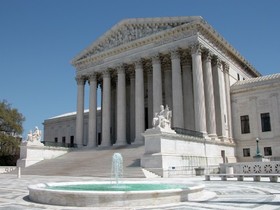Monday is going to be fun. The Supreme Court is expected to hand down the final decisions of the term—one of them dealing with the Ten Commandments—and then, it is widely thought, Chief Justice Rehnquist (who is ailing) will announce his resignation from the bench.
And then we’re in for months of wrangling about the replacement nominee.
Conventional wisdom is that the Democrats in the Senate will block whoever Bush nominates. I wouldn’t automatically assume that—there are many fine jurists with a conservative bent, and Democrats have approved of 96% of the Bush nominees to lower-than-Supreme federal courts. I think the reaction will turn on who the nominee actually is, not the fact that Bush nominated him.
What many overlook is that, with Rehnquist’s ride into the sunset, there will be essentially two positions open in the Court. One is the Chief Justice position, Rehnquist’s replacement. More often than not, the new justice is brought in to serve as Chief Justice. But it doesn’t have to be that way—an associate justice can be “promoted” to Chief Justice. Rehnquist himself was a former SCOTUS associate justice (only two other times was an associate judge promoted to Chief Justice).
Here, I think, lies the seeds of a compromise. It seems to me that Bush could promote Scalia to Chief Justice, and select a moderate Kennedy-type to fill the associate position. Or alternatively, promote someone like Stevens to Chief Justice, in “exchange” for a slightly far-to-the-right associate justice. Either of these solutions will save both parties from months of bitching, filibustering, etc. (Such a compromise is hardly novel—in fact, a similar compromise was anticipated in an episode of “The West Wing").
A compromise is in both party’s interests. Almost every poll has shown that the partisan wrangling in Washington (over filibusters, Schiavo, Bolton, etc.) has turned public sentiment against both the White House and hall of Congress. The real or perceived gridlock is going to result in retributions in 2006 and 2008, as the electorate will adopt an I-don’t-care-who-they-are-let’s-get-some-new-blood attitude.
The Chief Justice position is an interesting one. They don’t really have the power to sway the other justices or dictate what cases come before the Court. But they assign who writes opinions and the language of written opinions often works its way into the vernacular of everyday life. They also have some important adminstrative duties. You can read more here.
In any event, Monday—I think—is going to be interesting.

